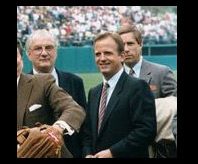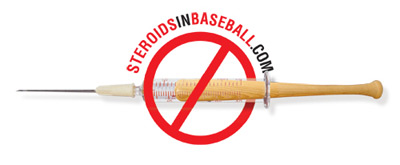Steroid Hall of Shame | Balco Timeline | Steroid Timeline | Mitchell Report




Home Page
Steroid Overview
Steroid Timeline: From Germany to USA
Commissioners and Controversy
- Kenesaw Landis
- Albert Chandler
- Ford Frick
- Colonel Eckert
- Bowie Kuhn
- Peter Uberroth
- A. Bartlett Giamatta
- Francis Vincent
- Alan Selig
Balco Timeline
Mitchell Report (409 pg pdf)
2002-06 Collective Bargaining Agreement (pdf)
2007-11 Collective Bargaining Agreement (pdf)
Peter Victor Ueberroth
Sixth Commissioner of Major League Baseball
1984-1988
Bowie Kuhn's impressive record of success would have led many to conclude that his appointed successor would also be someone who was intimately familiar with the inner workings of major league baseball. But, surprisingly, the owners instead went outside of the realm of baseball and selected someone with absolutely no professional baseball background or experience. On March 3, 1984, the owners selected glamour boy Peter Ueberroth as baseball's sixth commissioner (he didn't assume office until October 1, 1984).
Background:
• Peter Ueberroth attended San Jose State University on an athletic scholarship. He competed in the 1956 U.S. Olympic water polo trials but failed to make the team. He graduated from San Jose State in 1959 with a business degree.
• After college, Ueberroth became a vice-president and shareholder in Trans International Airlines. He worked at TIA until 1963, when he left to form his own travel firm (later known at First Travel Corporation). By the time he sold the company in 1980, it had become the second largest travel business in North America.
• Ueberroth served as President/Chief Executive Officer of the Los Angeles Olympic Organizing Committee, responsible for staging and operating the 1984 Games. A tremendously successful planner, his management of the first privately financed Olympic Games resulted in a postevent surplus of nearly $250 million, which was used to support national youth sports activities. Due to the success of the Games, he was named Time magazine's 1984 Man of the Year.
• As a condition of his hiring as baseball commissioner, Ueberroth's fining authority was increased from $5,000 to a whopping $250,000. In addition, his salary was raised to a reported $450,000, nearly twice what Kuhn was paid.
It was undoubted due to his exposure to the stringent Olympic drug policies and his knowledge of the increasing number of gambling and drug-related issues that confounded Commissioner Kuhn toward the end of his term that Ueberroth insisted on the huge increase in fining authority as a condition of his employment. Ueberroth, anxious to resolve the league's drug-related issues, said during a press conference held soon after his appointment, "Baseball has a responsibility to fight drugs, not to fight players." Unfortunately, Ueberroth would soon discover that neither the Major League Baseball Players Association nor the club owners shared his enthusiasm and problem-solving approach.
In 1985, the U.S. Attorney General in Pittsburgh prosecuted a cocaine case in which caterer Curtis Strong was convicted of selling cocaine to major league players in their clubhouse (19 players had been indicted). Many believed that such an important case would force baseball to take definitive action against the expanding drug problem. All that Ueberroth did was to call for mandatory drug testing. The MLBPA balked at the idea, and the owners were fearful of the associated rehabilitation and insurance costs. Hence, Ueberroth's initiative was unsuccessful, and the owners were hesitant to act Ð especially in light of the coming (December 1985) appointment of attorney Donald Fehr as the new MLBPA executive director.
During the same trial, player John Milner told the jury that no less a personage than Willie Mays had regularly consumed liquid amphetamines when he played for the Mets. Other testimony indicated that amphetamines (greenies) were being eaten like candy in major league baseball clubhouses and that every player, trainer, and owner was aware of this activity. (Allen "Bud" Selig was the owner of the Milwaukee Brewers at that time.) In response, Ueberroth chose not to move for amphetamines testing insofar as they were legal with a prescription. (He conveniently overlooked the testimony that the majority of amphetamines was being obtained without a prescription.)
Ueberroth later announced that he was abolishing the drug program established by Commissioner Kuhn because it lacked the provisions for mandatory testing. This rather arrogant, unilateral move was made without first consulting the MLBPA. Instead of dealing with the union, Ueberroth chose to send letters to every player asking him to submit to voluntary drug testing, with the results being confidential and without penalty. It is not surprising that he received no takers.
An example of Ueberroth's futility and desperation was revealed years later during an inverview with former union head Marvin Miller. Miller described the occasion that, when Ueberroth finally got together with the newly appointed Donald Fehr, he asked Fehr if the union would agree to testing even if it were only for the sake of public relations. Fehr had related to Miller that he (Fehr) was absolutely astounded by the suggestion.
When Ueberroth's drug policy was formulated in 1986, he had introduced a Drug Policy and Prevention Program that did not allow for random and unannounced drug testing. Instead, it was to be directed to players who had admitted to or been detected using illegal drugs. In 1987, Ueberroth suspended Padres pitcher Lamarr Hoyt for an entire season due to three illegal drug incidents. Arbitrator George Nicolau reduced the suspension to 60 days during a grievance hearing.
From a drug use standpoint, this was a very busy time for the commissioner. Many believe that Ueberroth's arrogance actually set the league's efforts back. Bowie Kuhn had left his post with a policy in place that had been agreed to by Marvin Miller and the MLBPA. Instead of building upon what Kuhn had achieved, Ueberroth opted to wipe the slate clean and start over. Unfortunately, along the way he lost the trust and confidence of Donald Fehr and the union members.
"It is unfortunate that he (Ueberroth) did not seem to have the deep attachment to the game itself that would have motivated him to stay on. It is probable that he never envisioned his role in baseball as more than a temporary one." — Lee MacPhail in My Nine Innings (1989).
This website & Syringe Logo are owned and copywritten by Allan Doherty 2006 - 2009.